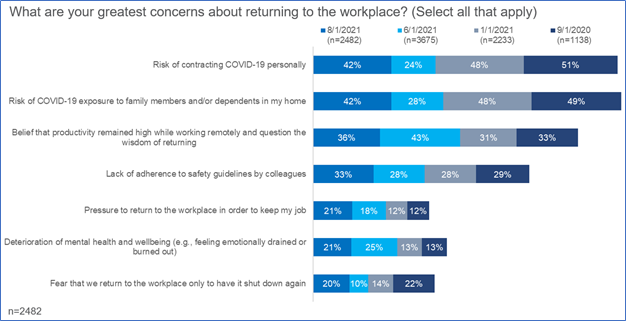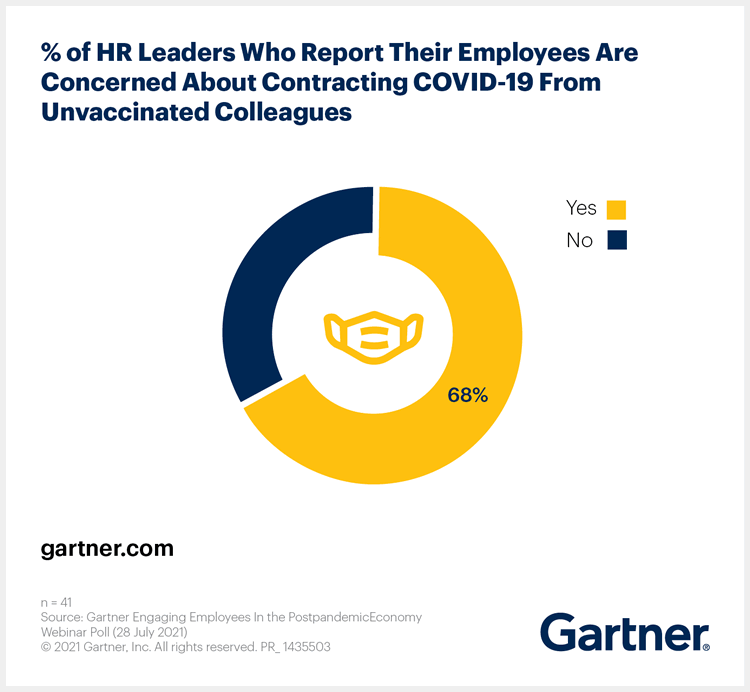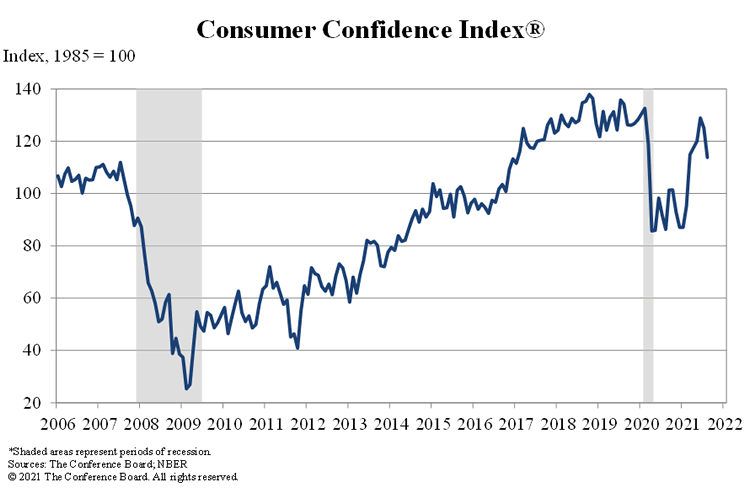Several countries go through another COVID-19 resurgence, driven by the Delta coronavirus variant, as we’re approaching the fourth quarter of 2021.
The reasons for the outbreaks have been widely covered and can differ quite a bit per country/region. However, in nearly all affected parts of the globe, discussions about mandatory vaccinations are on the rise, also among organizations that continue to delay workplace reopening.
66 percent of organizations are delaying reopening their offices due to new COVID-19 variants
The impact of the resurgence on organizations can’t simply be solved by future of work technologies, hybrid work models (whereby the demand for flexibility isn’t just a matter of knowledge workers at all), or safety measures; more will be needed.

The growing worries of workers about the Delta variant
The simple fact is that vaccinated people are scared to share the workplace with others who aren’t (fully yet). The situation risks creating a work environment with two groups with different ‘rights.’ Several organizations, for instance, consider limiting some spaces for vaccinated only. The same is happening in several countries on a broader societal level.
One can debate this, of course (and in many countries, protesters do). If you look at it from a workplace perspective (our focus), you can’t say that creating two groups of employees is the best approach for a sound culture, however. And it certainly doesn’t result in the sense of community and belonging one strives to realize with smart offices.
Yet, the challenges are real. In the US, for instance, 42 percent of workers are worried about returning to the workplace for fear of contracting COVID-19, according to updated findings by The Conference Board, announced on August 31, 2021. By way of comparison: in June, only 24 percent had that concern.

The surge of the Delta variant is the main culprit per The Conference Board. Since then, at least two variants have been added to the “variants of interest list.” One of them has been named Mu and seems to be more resistant to vaccines.
Yet, as the idea of herd immunity is gradually ruled out with vaccinated people spreading the Delta variant – and also getting ill from it – the new variants aren’t even needed to scare people.
Every organization is — and certainly should be — asking: When should we return employees to offices and other work locations? Should we close offices we’ve already opened? Should we mandate vaccines? (Brian Kropp, Gartner)
Workplace reopenings and consumer confidence in times of Delta
The fears of employees have a clear impact on the (re)opening of workplaces. According to a survey by Gartner, conducted on August 24, 2021, an impressive 66 percent of organizations are delaying reopening their offices.
Here as well, the new COVID-19 variants are mentioned as the culprits. According to Gartner’s Brian Kropp, “leaders have been determining if and how to mandate employee COVID-19 vaccinations for the last several months, and the FDA’s full approval of the Pfizer vaccine is another aspect employers are now considering”.

Can you mandate vaccination as an employer? And, if so, is it recommended? As per usual, each country and region is different.
Per Gartner’s poll, 16 percent of organizations effectively mandate vaccination. While that’s an impressive increase compared with January 2021 (when only 2 percent of companies did so), it’s still the minority.
Yet, if there’s one thing we know now, it’s that things can change very fast with COVID-19. Thirty-three percent of respondents said that FDA approval of the Pfizer COVID-19 vaccine increased the likelihood that their organization will mandate employees to get vaccinated. Yet, almost 50 percent of respondents don’t feel that FDA approval impacts their decision to require vaccination.
Employers want the benefit of a vaccinated workforce, but don’t want the responsibility of having to implement and manage a vaccine mandate. (Brian Kropp, chief of research for the Gartner HR practice)
However, if vaccination isn’t mandated, that doesn’t mean organizations don’t track employees’ vaccination status.
Moreover, per Gartner, 21 percent of companies limit access to certain workplace features such as the gym, cafeteria, or bus transportation for unvaccinated employees. As said, it’s this kind of approach that is happening on a broader scale in several countries and is part of a mix of restrictions and incentives.
Check out Gartner’s press release on the HR poll and read Brian Kropp’s article on how the Delta variant is scaring employees, delaying return-to-work plans and driving vaccine mandates, with advice for HR leaders.
Fifteen percent of poll respondents reported that their organization is mandating that employees get COVID tests before coming into the office if they don’t show proof of vaccination. (Gartner)
To make things worse: the worries regarding the Delta variant have sent US consumer confidence to its lowest level since January 2021.
However, quoting Lynn Franco, Senior Director of Economic Indicators at The Conference Board: “While the resurgence of COVID-19 and inflation concerns have dampened confidence, it is too soon to conclude this decline will result in consumers significantly curtailing their spending in the months ahead”.


